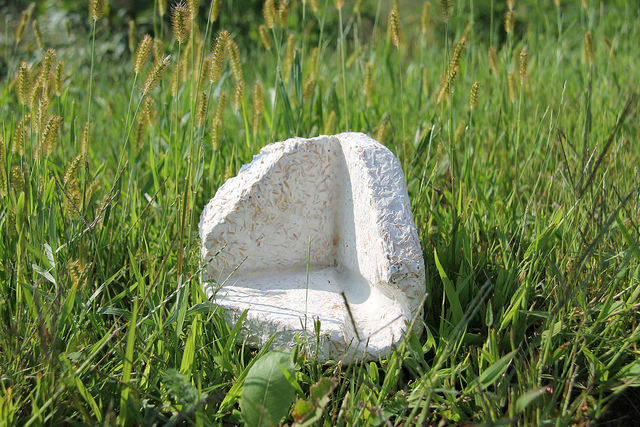
Every time I buy something encased in styrofoam blocks or get a package filled with styrofoam “peanuts,” I feel like a traitor to the planet.
And, well, I should.
Styrofoam, which is the trade name for polystyrene, is made from non-renewable petroleum. It is not biodegradable and will stay in landfills or wherever it ends up for thousands and thousands of years.
The EPA estimates that in the United States, 25 percent of everything in our landfills is polystyrene—a material made from benzene, a known carcinogen. Even worse, the majority ends up in the great plastic gyres in our oceans as well as stomachs of sea animals and birds and can subsequently possibly be found in us.
You probably know some, if not all of this already. And, like me, you probably feel pangs of guilt every time you’re faced with disposing of this non-disposable scourge. So is there a solution?
Yes there is! Thanks to the innovation of a American company called Ecovative founded by Eben Bayer and Gavin McIntyre—two young, innovative inventors—polystyrene is being replaced by packaging made from mushrooms.
As Eben describes in his fascinating TED talk, “Using part of the mushroom you’ve probably never seen—analogous to its root structure…called mycelium—we can actually grow materials with many of the same properties of conventional synthetics.” Mycelium is the vegetative growth stage of fungi and contains no spores.
Here’s the really cool thing: mushroom packaging is completely compostable and will biodegrade in a few weeks! You can literally mix it into your garden soil.
The packaging or other similarly made products will last for many years if left in your house. But as soon as it mixes with soil, the bacteria in the soil produces the enzymes needed for it to break down.
Similarly, if the product winds up in the ocean, unlike styrofoam, it will break down within 90 days. And since it is completely non-toxic, sea animals will not be harmed if they ingest it.
The packaging can be made locally using agricultural waste from any country or region. The food byproducts are combined with the mycelium to create the mushroom packaging. In China for instance, rice husks or cottonseed hulls might be used. In Europe or North America buckwheat husks or oat hulls can be used. That means production can be localized to reduce shipping costs and fuel consumption from shipping. The company’s vision is to have small facilities in many locations to produce the packaging.
Mushroom packaging prices are competitive with polystyrene. So why would any sensible company not use it instead of the hated styrofoam? Some major companies are already using the product and Ikea recently announced that it plans to begin using mushroom packaging.
Dell started using Mushroom® Packaging on a pilot basis in 2013 but are now set to expand its use in fiscal year 2016. Oliver Campbell, Director of Procurement for Packaging in a 2012 interview said that in performance tests the mushroom packaging performed better in drop tests than polystyrene.
Joanna Yarrow, head of Sustainability in the United Kingdom for Ikea, announced to the press that it is looking into using the packaging as part of its sustainability commitment.
Crate and Barrel uses the packaging to protect furniture legs.
I love Ecovative’s Mission Statement:
“Ecovative’s core mission is to envision, develop, produce, and market Earth friendly materials, which, unlike conventional synthetics, can have a positive impact on our planet’s ecosystem.
We are committed to working with industry and consumers to rid the world of toxic, unsustainable materials. We believe in creating products that enable companies and individuals to achieve their sustainability goals, without having to sacrifice on cost or performance.”
We can’t ask much more from a company than this, now can we?
Here’s how it works:
~
Author: Gayle Fleming
Editor: Katarina Tavčar
Photo: Mycobond/Flickr






Read 2 comments and reply